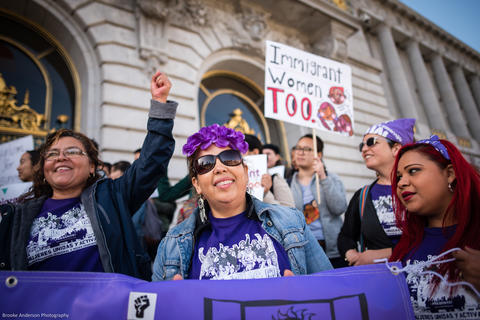Help Defend Asylum
CGRS relies on the generous support of people like you to sustain our advocacy defending the human rights of refugees. Make a gift today!

(June 2020) - Refugee survivors of domestic violence were among the first targets in the Trump Administration’s sustained assault on our asylum system. In June 2018, then-Attorney General Jeff Sessions issued a sweeping decision known as Matter of A-B- in an attempt to eliminate asylum protections for those fleeing domestic violence and gang brutality. Since the decision came down, we have seen many judges single out women’s asylum claims for discriminatory treatment. As a result, asylum grant rates have plummeted for Central American women and others seeking refuge from violence in their homes and communities.
After nearly two years of strategic litigation to challenge the A-B- decision, this spring we saw a pair of promising victories in the federal courts of appeals, in De Pena Paniagua v. Barr and Juan Antonio v. Barr. These decisions mark important progress in our collective efforts to reverse Matter of A-B- and reopen pathways to protection for domestic violence survivors and others impacted by the ruling.
CGRS’s client in the Matter of A-B- case, Ms. A.B., has expressed hope that these recent decisions may signify a turning of the tide for survivors. “It has caused me great pain to think that my case has been used to justify the rejection of other women like me seeking protection from the violence that plagues our countries,” she has said. “This gives me faith that the decision in my case will not close the door for others and that my case too will eventually prevail, and I will be able to hold my children again in safety.”
Progress at the First Circuit: De Pena-Paniagua v. Barr
Jacelys Miguelina De Pena-Paniagua’s asylum case is emblematic of the protection crisis created by the Matter of A-B- ruling. Last year the Board of Immigration Appeals – the Justice Department’s highest level of immigration review – denied asylum to Ms. De Pena, a domestic violence survivor from the Dominican Republic, using Matter of A-B- as justification to deprive her of a fair hearing. Ms. De Pena and her attorneys from the Law Offices of Johanna Herrero appealed the Board’s decision to the First Circuit, where CGRS presented arguments in support of Ms. De Pena as amicus (“friend of the court”).
In April the First Circuit overturned the Board’s denial of asylum to Ms. De Pena and reaffirmed that refugee women like her are in fact deserving of protection under U.S. law. Importantly, the court decisively recognized a fundamental principle that had been the law of the land before Sessions intervened in Matter of A-B- – that women are a legally protected group and that they are persecuted in many countries precisely because of their gender.
To learn more about the significance of the First Circuit’s ruling in Ms. De Pena’s case, De Pena-Paniagua v. Barr, check out CGRS’s video explainer and Spanish language factsheet.
Progress at the Sixth Circuit: Juan Antonio v. Barr
Like Ms. De Pena and Ms. A.B., Maria Magdalena Juan Antonio sought safe haven in the United States after enduring years of brutal domestic violence in her home country. The Board of Immigration Appeals wrongly denied Ms. Juan Antonio asylum, ruling that she would be able to safely escape her abusive husband if returned to Guatemala – disregarding the fact that he had continued to make escalating threats on her life even after she obtained a restraining order against him.
Ms. Juan Antonio was fortunate to have the support of an attorney, Margaret Wong of Margaret W. Wong & Associates, LLC, who took her case to the Sixth Circuit Court of Appeals. In May, the Sixth Circuit reversed the lower courts’ denial of asylum to Ms. Juan Antonio and sent her case back down to be reconsidered. The court soundly rejected Sessions’ attempt to close the door to survivors in Matter of A-B- and reaffirmed that women seeking refuge from countries where gender-based violence is perpetrated with impunity can qualify for asylum. The Sixth Circuit conducted a particularly strong examination of the broader social context and lack of government protection available to indigenous women like Ms. Juan Antonio in Guatemala.
To learn more about the significance of the Sixth Circuit’s ruling in Ms. Juan Antonio’s case, check out CGRS’s video explainer.
Photo credit: Brooke Anderson Photography
 Get help
Get help Log In
Log In




